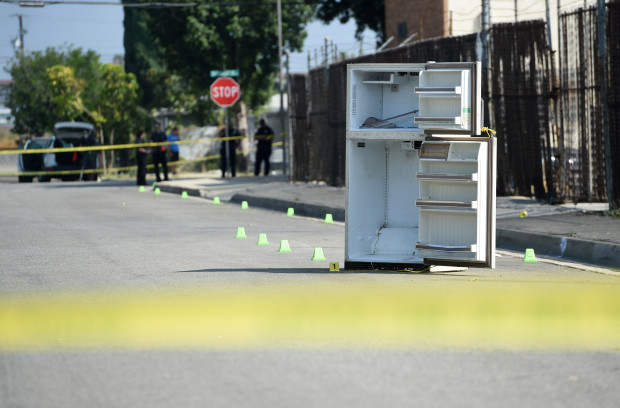It was a milk curdling scene.
Our 20-year old refrigerator quietly passed away one night. On the floor, a pool of melted water stood testimony to its incontinence. Its silence—testimony to its demise.
The repairman revived it. Extreme times call for extreme measures. But, with no parts available “anywhere in the United States,” the prognosis was bleak. In the week of trying to buy a new one, our refrigerator stopped and started on its own three times—mysterious actions. A confirmation of a higher power? A last gasp for life?
The search for a new kitchen companion was frustrating: when is 36 inches wide not 36 inches? When it’s 35 7/8 inches. If you’re familiar with the laws of physics, you can appreciate that a 36 inch refrigerator will not fit into a 35 7/8 space.
So, the saying is true—you don’t miss your ice machine until your well runs dry.
Everything spoiled. Or, did it? It seems immoral to throw away food. What about jars with tight lids? You never know when you might crave a sweet gherkin.
So, I began the task of denuding our defrosted fridge. I opened jars one-by-one, took a sniff and wondered. Will anyone ever eat pickled jalapeños? In an over-abundance of caution, whole jars were tossed. Capers and Thai peppers filled the sink waiting to be flushed down the disposal. Mustard and ketchup—into the trash.
I found things I didn’t know we had. Like a jar of Stubby’s Barbecue Sauce—of unknown provenance and unknown outcome. It could be tasty or it could be Novichok. You don’t want to play Russian roulette with Stubby’s.
First, I emptied the refrigerator—the daily items like eggs, milk, and radishes. But, also strange tubers that lose their defining lines when the bottom drawer becomes room temperature—is it an eggplant? Or, jicama? Or, what?
A refrigerator is a just storage closet plugged into the wall, where we store many of our food memories. Like the time you enjoyed the capers at an Italian restaurant. So, you bought some. Then forgot and bought another jar. For years, the memory of capers rested in two jars in my fridge waiting to be rediscovered.
I dumped two jars of capers.
The freezer was 100% casualties, completely overrun by unicellular bandits. Most everything was unrecognizable. Which is sad, because the freezer used to be well-defended with frozen bagels.
Abe Brumer—the father of a friend of mine—used to say that the perfect murder weapon was a frozen bagel—hard as rock for the deed, then all the evidence melts away in two hours.
I spotted a piece of Tupperware—the ritual vessel of food preservation—in the freezer since the Ice Age. I opened it. It looked like the tumbling end-point of a mud slide.
The unidentified mud slide in the Tupperware reminded me of the brain. We collect and post items for recall just like we might buy a jar of artichokes or freeze a stew, if that’s what the mud slide was. Pleased, we stash the artichoke in the fridge, where it sits behind the milk or next to the pickles. After a while, the artichokes become a forgotten part of the fridge—lost in plain sight. But, it’s still there.
Sometimes our brain hides some memory behind the milk carton. Or, the brain buries a memory in Tupperware deep in the freezer. You don’t think about it, but, for some reason, it’s still there.
Usually, what goes in the refrigerator stays there until someone moves it. Here, though, the brain is different. New memories are kept in the hippocampus—like you keep the eggs in the fridge door—ready when you need them. But, after a year or so, the brain transfers the memories into the cortex—maybe akin to our mud slide stew in the freezer—too good to throw away, anyway, it might come in handy someday,
But, here’s a quirky part of the brain: memories that were lost, thrown away, or too long ago to ever return, sometimes do return. Something will trigger you and you have a fresh memory of a toy or your old street or a class mate. Something that you may not have thought of in decades.
I call it a fresh memory, because scientists disagree whether it is truly a memory or something that your brain fabricates for unknown reasons and we call it memory. Does it have a sense of familiarity because it fits into our existing memory or because the brain patches items together to make it fit?
Not long before my 65th birthday, I woke up with a name in my mind—Corky. I knew that this Corky was someone I vaguely knew from high school in Des Moines. As I assembled these pieces, slowly his family name came to me, a vague image of his face and that he liked to play golf. I have never thought about Corky before and have no other memory of him. The last time I saw him—thought I don’t remember any instance of seeing him—would have been 48 years ago.
Why did this happen?
No one knows. But, the brain moves memories. You may think they are safely stored or safely forgotten, but the brain reshuffles the deck. Are you certain that your first dog was a blue lab? What if blue lab is just an overlay that you have concocted to satisfy your need for dog memories? Ask your family and you’re likely to have 6 different first dog memories. One of them may be right, but everyone could be wrong, too.
If you want to preserve your thoughts, ideas and memories, there’s an excellent system: write them down. No need for an app—just pencil and paper.
And, review your memory refrigerator from time to time. Take out your memories—like a jar of artichokes from the shelf—and examine them. You can do this when you’re walking, waiting for a bus, or waking up. Try to imagine walking through your childhood home room by room—how much can you see in your mind? Try to hear the voices of your grandparents—can you hear them?
Every time you bring a memory to your mind you strengthen it. Do you need all these memories to survive, get a better job, or find true love?
Yes, because you are your memories; you are the total effect of your experiences as you remember them.
Keep track of the food stock in your refrigerator, too. Check that Tupperware before it becomes unknown mush. They say you are what you eat. But, when the refrigerator dies, you are what you never ate.
Keep your refrigerator running.





